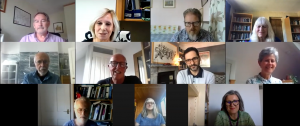Thoughts on the future of social work research

Published by Professional Social Work Magazine 7th July 2020
Social work research needs to be more accessible, relevant to practice, diverse and co-produced with people who have lived experience.
It should also strengthen social work as a “social justice profession” and reflect its global dimension.
These were some of the points made by social work academics at the launch of an anniversary edition of the British Journal of Social Work (BJSW) celebrating BASW at 50.
Past, current and incoming board members of the journal also discussed how politics has shaped the context of practice and the content of the journal since its launch, also 50 years ago.
David Ward, of De Montfort University, said: “The 1970s and 1980s was a period of political turmoil where the credibility of the profession came to be challenged, particularly in relation to child care with the numerous child abuse cases that took place during that period.
“We also saw a greater concern for evidence and the ability to be able to defend what the profession was about and the work people were doing on the basis of the outcomes achieved rather than the basis of the intentions, which was much more the focus in the 1970s.”
BASW chief executive Ruth Allen said the 70s and 80s saw a focus on radical social work, ethics, an awareness of structural inequalities and the “unfairness of society”.
“There were lots of debates about the extent to which that was determining people’s lives and the role of social workers in helping people with their personal difficulties.”
That, she said, influenced the emergence of anti-discriminatory practice.
The journal’s outgoing co-editor Malcolm Golightly of the University of Lincoln noted how social policy from the 1980s onwards was shaped by “scandals”, particularly those involving child abuse cases, which was often unhelpful to the profession.
“Gene Packman and Bill Jordan [writing in BJSW in 1991] provided a critical account of child legislation of the last five decades and how the care of children became a key public concern, pointing out that legislation is a rather blunt instrument and needs to be combined with adequate resources, training and research and often that isn’t the case.
“If you look at the last decade the effects of austerity for example has been punishing on social work and people with lived experience.”
Former editor Professor Jim Campbell of University College Dublin said policy was always politically-driven. He added a note of caution about evidence-based practice, saying: “I think we need to be cautious about assuming science will deliver on social change.”
Viv Cree, emerita professor of social work at the University of Edinburgh, observed how social work education had become a “political football” and saw a conflict between the policy and the profession’s ethics.
“It has been really difficult to be part of something when the state is withdrawing from many of the things we believe are important. It becomes difficult to know how you help people to become the critically aware practitioners you want them to be.
“There’s that horrible expression that [new social workers] need to hit the ground running. I would rather they were able to hit the ground thinking.”
Peter Unwin of Worcestershire University drew a distinction between producing practitioners that understood the concept of “doing with” rather than “doing to” people.
“It has always been an uncomfortable relationship. There are people who I teach who just don’t get it, that you go on a qualified course and become a professional and yet you listen to people who have become mentally ill, who have been perpetrators or with limited cognitive abilities. It is more marginalised than it should be in our profession.”
He noted BASW has “moved closer” to working in partnership and co-production with people because it resulted in a “greater richness of knowledge.”
He said using the “qualitative experience” of social workers and their ability to not “deny our humanity in that there for the grace of God go I” was the way forward.
Looking ahead, the journal’s incoming co-editor Vasilios lokamidis of Essex University said: “Some of the social issues social workers deal with have no borders. It would be illogical to say specific countries can deal in isolation with issues like environmental disasters, or human trafficking or the pandemic.”
Also key was expanding on social work’s “sociological human rights foundation” and to strengthen it as a “social justice profession”, he added.
This article is published by Professional Social work magazine which provides a platform for a range of perspectives across the social work sector. It does not necessarily reflect the views of the British Association of Social Workers.
